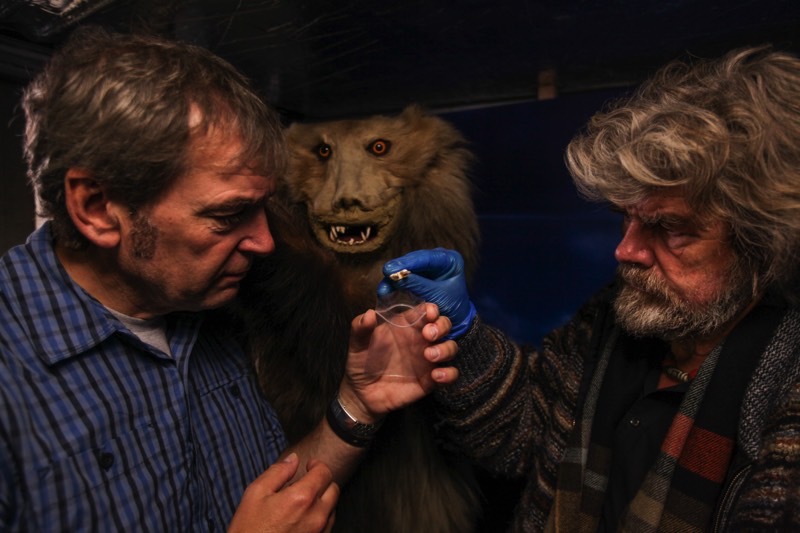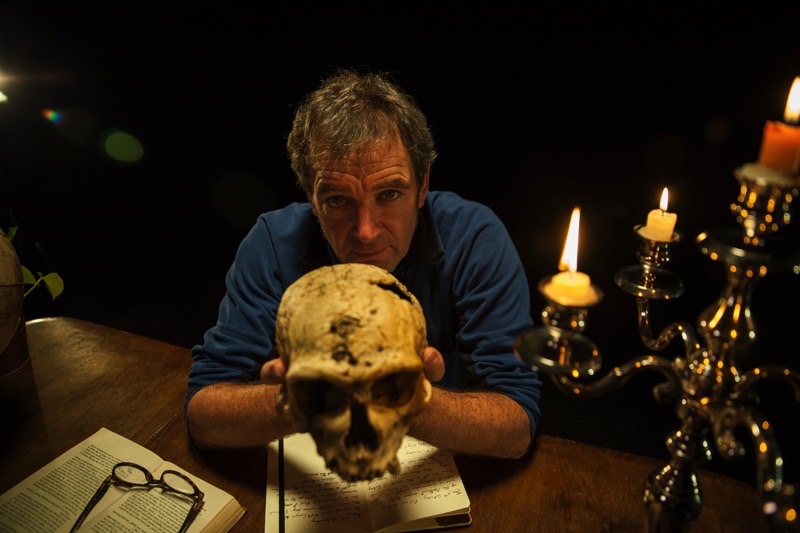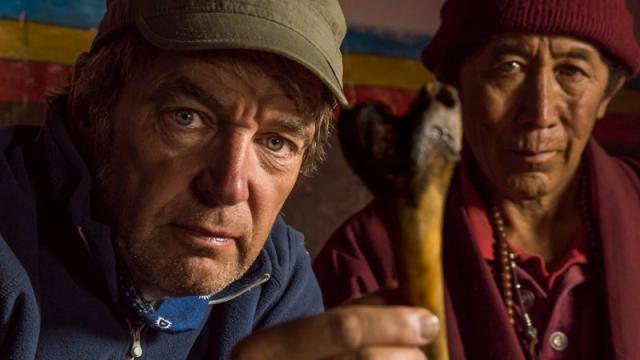In the US, Animal Planet’s “Monster Week” is filled with animal-attack specials and episodes of the network’s big hit, River Monsters. But there’s one program that taps into a surprising amount of science: Yeti or Not, which follows Dr Mark Evans as he roams the Himalayas, looking for evidence of the mythical beast.
Dr Mark Evans examines a rather curious bone in the Himalayas. (All images: Animal Planet)
Yes. We know you read the word “yeti” and had some immediate questions, sceptical thoughts, visions of the Matterhorn ride at Disneyland and so on. So did we, so we talked to Evans, who’s a veterinarian when he’s not travelling the world filming TV shows, ahead of the Yeti or Not world premiere. In the special, Evans comes upon some unusual samples that he plans to submit for DNA testing, hoping to prove his theory that the Yeti of legend is either: a) a hybrid bear species; b) a human ancestor that somehow defied extinction; or c) both, existing simultaneously.
What interests you about cryptozoology, and yetis in particular?
Dr Mark Evans: I think it’s the intensive, sort of childlike curiosity that’s driven me throughout my career — I just need to answer questions about biology. And yetis have been this one longstanding question in biology that actually we struggle to get to the bottom of. It’s just so fascinating; it’s interesting that we call it cryptozoology, simply because it’s hidden zoology. There are lots of animals that have been hidden until relatively recently that we now accept as perfectly normal. And the yeti also have something to do with the human relationship with the natural world. It’s become such a part of the Tibetan culture, in stories that have been told over generations.
Do you consider yourself to be a sceptic?
Evans: I am, hopefully, a healthily intelligent sceptic. I won’t accept things at face value — I never have — and the tool I have in my toolbox is science. I approach these things with a human interest, of course, like anybody else. What I want to do is entice other scientists, who are much more clever than me, to use their skills and experience, as well as the scientific tools they now have available, to see if we can add to the pieces of the jigsaw puzzle and help the community of people who want to find answers [about the existence, or not, of Yetis].
Obviously, the explosion over the last 10 or 15 years of our ability to dig about in DNA is a tool that I think is incredibly valuable in this debate, and one that I’ve been incredibly keen to see if it can try and help us.
One of Animal Planet’s most popular shows is Finding Bigfoot, which follows sasquatch hunters who are hoping to record a close encounter. But Yeti or Not has scenes of lab work rather than night vision in the deep woods. What inspired you to structure it that way?
Evans: Because I’m a scientist. I think the great thing about the whole world of Bigfoot and yetis is that there’s an army of enthusiasts who are utterly fascinated by the subject and are keen to do the legwork to try and find samples. If it wasn’t for the people that I meet along the way who are finding samples, or have the stories to tell about their own personal experiences, we wouldn’t be able to achieve anything. What I can bring to it, other than a sense of curiosity, are the tools to actually test things. That’s the cool thing about the scientific approach, and certainly from a DNA perspective. And DNA doesn’t lie.

Evans with acclaimed mountaineer Reinhold Messner, posing in front of an alleged yeti taxidermy that was once owned by Nazis.
Yeti or Not also contains a lot of scenes of you travelling the Himalayas, looking for people who’ve collected those valuable samples and stories. Were the locals receptive to your inquiries?
Evans: I’ve been very lucky; I’ve travelled all around the world filming animals and the people who interact with them, and there’s no question that the people in Nepal and the high Himalayas are some of the nicest, most authentic people on planet Earth. It was a huge privilege to spend time in their company. Sometimes people will say to me, “Oh, they’re just making up stories and telling you what you want to hear.” But I can genuinely say, from my experiences and the people I’ve spoken to, they have no axe to grind. Often they’re really surprised that we’re even interested in yetis, because to them, it’s just part of their life and world. And they are as excited and interested in the fact that we’re trying to shed a scientific light on the subject as we are.
Another reason why I think it’s important to make films like this, and conduct investigations like this, is that things are changing — it’s very much the older generation who are tuned into these stories and that culture. Inevitably, more young people are leaving the high Himalayas, and these stories may become diluted and fade with time. I think it’s important to harvest the knowledge, experience and storytelling from the people who are still there, living in these incredibly remote areas.
Yeti or Not is an amusing yet perfect title for the special. Was that your invention?
Evans: Sort of! It was the production company that finally came up with it. But just the word “yeti”, frankly, whatever you’ve got after it, I think intrigues and fascinates an audience.
The thing about science is that we can’t prove they’re not out there. If we can find biological samples and can say, “We’ve tested this and there is nothing in the databases that exist on planet Earth that say this is a known species. This is something different” — then we can, of course, prove that there is something out there. But we can never, ever prove that the yeti does not exist, because we simply will not be able to do that. So we have to keep looking.

